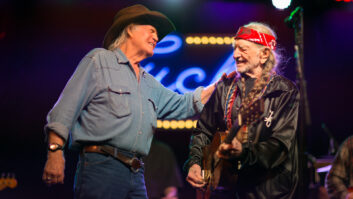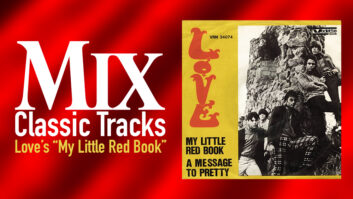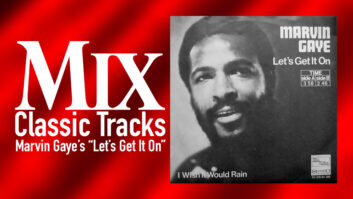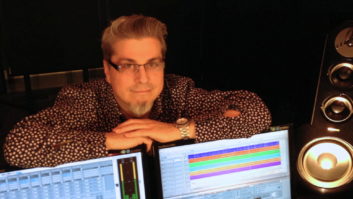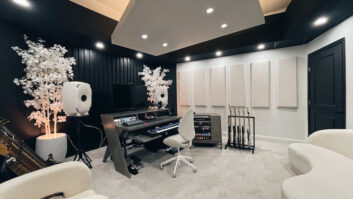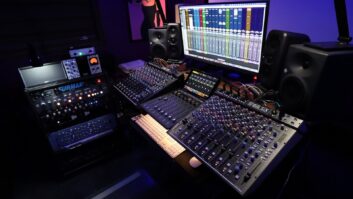BACK TO NEW YORK FOR “NIGHT AND DAY II”You’ve got to hand it to Joe Jackson for having the guts to invite critics to compare his current release to his classic 1982 album, Night and Day. Journalists always summon up the ghosts of artists’ past work anyway, but Jackson was bold enough to actually title this new project Night and Day II. And if it weren’t enough to represent this as a sequel to the most successful album of his career, he actually incorporates that unforgettable bell riff from the hit “Steppin’ Out” into this current album, which seems extraordinarily courageous when it comes to the potential wrath of the journalistic pen. Wasn’t Jackson worried that he might be accused of ripping himself off?
“It occurred to me, because it’s the kind of stupid thing people say,” Jackson replies with a laugh. “I thought it was appropriate, and it works for me, and I think I am entitled. It’s my music. I think I’m allowed to quote myself. It’s not as if I’ve done 20 albums that are all the same. I have never quoted myself before, but I think it’s really appropriate musically and thematically, and because I’ve paid my dues. I’ve been doing this for 20 years, and if I want to quote myself, I’m allowed.”
The idea for the “spin-off” project didn’t come to Jackson until he was ensconcsed in the creating of this current record. “It started to evolve very loosely as a project about New York City, because I’ve been here for quite a long time, and I had so many observations of characters and situations that I wanted to write about. It’s been building up in the back of my mind, I suppose. Usually, if there is an overall concept to an album I do, it takes shape as I go along. I don’t really start off with a concept. It was the same thing with Heaven and Hell. It started with certain ideas and then grew. Somewhere along the line, I start to see the shape of it more, and that starts to influence how I work. In this case, once I had two or three of the songs written, I started to think of it as 24 hours in New York City from the point of view of several different characters. The idea of calling it Night and Day II really came a lot later. In fact, I wasn’t sure it was a great idea, to be honest. The title sets me up for comparisons that may or may not be helpful.
“Night and Day really wasn’t a concept album about New York at all, and Night and Day II is much more so. The first one was the first record I made in New York, and it does have quite a lot of New York flavor but from the point of view of someone who was still relatively new to the city, whereas Night and Day II is obviously someone jaded and cynical,” he says. “I’m kidding, of course. I would hate people to think that was the main thrust of it, because I think it has a lot of humor and other stuff going on. I think it has a lot of different levels to it. It’s more of a nuanced, mature perspective.”
He can’t recall how it came to him to re-use the “Steppin’ Out” bell part, except to note that it has come to define a piece of the New York City vibe. “I like bright, tinkly sounds,” Jackson ponders. “I know when I was writing it I was thinking of the city skyline at night and lots of lights, and I think all those chiming kinds of piano chords and bells conjure up those lights.”
The new album, which was recorded to Sony 3348 at Avatar Studios and mixed on the SSL Axiom MT in their “D” room, opens with an interesting juxtaposition of classical cello and Latin rhythms that both mesh and conflict simultaneously. “I guess if I wanted to analyze myself, it would probably say something about the energy and excitement of the city, as well as a note of lyricism and melancholy, which is all mixed up,” Jackson comments.
For Dan Gellert, engineer and associate producer, one of the greatest challenges – and loves – in Jackson’s music is the combining of such different worlds: the acoustic instrumentation with the programmed synth parts, and the meshing of the sonic properties that involves.
“Probably the biggest challenge is in the mix, to make it something commercially viable, strong, aggressive and forward, meshing the two worlds and creating spaces with reverbs and delays that both work, instead of having one sound very electronic and techno and the other sound lush and beautiful. It’s not particular to this album; it’s particular to the way Joe hears music,” says Gellert, who worked with Jackson on his Heaven and Hell, the instrumental Symphony 1 and mixed the recent Live in New York album. “I use all the stuff everyone else uses – the Lexicon 480, Lexicon delays and a combination of vintage compressors and newer compressors. I’ve been using a new Sony reverb machine [S777], which is an amazing-sounding unit. It’s this new technology that Sony has been dealing with. It’s a sampling reverb, so somehow they sample actual acoustic spaces and make it into a digital reverb you can use. I guess it’s the next generation of digital reverbs, because it sounds really great to my ears. I mixed this on a digital console, which adds a whole other level of detail available, because everything is automatable. You have to think of the digital signal path in a different way, and you really have to use your ears. It’s not the same thing as an analog signal path, but it can work.
“The biggest pro of using a digital console is the level of detail that is immediately available when you’re mixing,” says Gellert, who, as chief engineer at Avatar Studios (formerly the Power Station), actually had a hand in putting the rooms together. “To give you an example, on an analog console you can do everything. With automation you can do anything you want, but sometimes it’s a bit of a negotiation. If you have 10 hours to do a mix, and you want to set up an effect, it can take 15 minutes to set it up to get it right. You can always do it, given enough patch cords, but that’s a negotiation. That’s 15 minutes out of a 10-hour mix, whereas with a digital console, because everything is automatable, 15 seconds after you decide you want to do something, it’s done. Of course, along with that comes a level of complication, but when you’re at the level of knowing how, it’s a great tool to be able to get to that detail instantly.”
While the London Royal Academy of Music-schooled Jackson comes in with completely written charts and scores, he doesn’t really demo his songs unless he needs to for another singer he may be using on the project. (Marianne Faithfull sang lead on one track of this album, “Love Got Lost.”) His own equipment, Jackson says, is pretty bare-bones:
“I have a few synths and a computer with a sequencing program. I’ve been using Studio Vision, but I think I’m going to be changing, because the company went bust. I don’t have a home studio – I don’t like the idea of it. I just have a writing setup, which is my laptop and Yamaha KX88 keyboard and a few synth modules. I have an E-mu Sampler E-IVx and a Roland JV-1080, which I like, an E-mu Orbit and a Nord Lead. Of course, I have a piano as well, which I do quite a lot on, and it is still the best.”
He says while he has very definite sonic ideas, he is not at all a “gearhead” and leaves the technical decisions to his cohort, Gellert. “I find him good to work with. I don’t need a co-producer, as such, but it’s nice to have someone who is a very good engineer, and who can take care of a certain amount of stuff that I don’t really want to deal with on the more technical end of things. That’s why he gets an associate producer credit – because he does take over a little bit of the production duties, yet at the same time, the end result is my idea of how I wanted it to sound. I just think he makes things sound good. And sometimes when you’re working with a lot of keyboards and sampled stuff, as opposed to a band and a lot of guitars, it can end up sounding a bit thin or unsubstantial, but somehow it doesn’t with Dan’s engineering. I’m not very specific about how to get a sound, but I am quite fussy about how I want things to sound,” notes Jackson, who adds that even though his studio savvy has definitely increased through the years, he still prefers not to become too involved in that respect. “I’m more aware of what can be done and how to do it, without really delving into the area of being an engineer, because I believe there’s only so much you can do. You can’t do everything well, so I prefer to put my efforts into being as good of a musician as I can be, rather than also trying to be an engineer. People diversify too much sometimes. I think I have done that in some ways in the past.
“I usually have a sound in my mind, because it’s part of the arrangement to me if something has a delay on it, or a lot of reverb or none. So I leave it up to Dan to come up with something that sounds right to me. Sometimes I’m only able to express it in a vague way like, `I’m standing in a back alley between two big buildings and shouting, and that’s the kind of sound I want,’ or `I want to have a repeat that’s going in time with the beat, but not quite, it’s a little slow so it kind of rubs against the beat.’ Sometimes I’ll say, `I want it to be kind of like this, but not too much,’ and it might not make a lot of sense, but he seems to get what I’m talking about.”
Although Jackson considers the vocals the toughest part of the process, requiring warm-ups and herbal teas, Gellert says he particularly enjoys the vocal recording with Jackson. “On this album, Joe decided instead of having all the [instrumental] tracks completed and sparkling clean, and then spending the last two weeks doing vocals – which is a lot of pressure for any vocalist – that the last couple of hours of every day he would go in and sing, and that became a habit. Things flow a little easier that way. It’s a pleasure to do vocals with Joe, because he’s such a pro at it. He knows his voice so well and what he wants to do and how to achieve it. There’s a lot of experimentation involved, but immediately the level of where it’s at before the experimentation begins is great already. So it’s all about being creative when he’s doing vocals, and he tries this and tries that and hears it and goes this way and goes that way, and in the end, it comes out great.
“It was a very creative atmosphere,” Gellert continues. “For example, there were different attitudes he wanted to portray in the songs, different characters he wanted to be. One of the songs is called `Happy Land,’ which is about a club that burned down in Brooklyn, and people died in it. And the song is about that, and Joe sings it as a bit of a journalist, telling the story. So he wanted to get into that frame of mind. It was a result of Joe doing it, listening to it back, then adjusting. He has great ears that way. The process was fun, hearing the ideas come out of him and then having them be realized and have them come out of the speaker.”
The toughest one for Jackson was the last track on the album, “Stay.” “I wanted the vocal to have a sound that was sort of spacious, that was kind of floating in a lot of space, but without sounding distant or muddy,” Jackson says. “I wouldn’t have known how to get that sound, and I don’t know how Dan did it. I know he combined two or three different effects, and I think it sounds great.”
“I think that one sounds really good, too,” Gellert concurs, going on to explain the process. “I basically used `expensive’ reverbs. [Laughs.] It’s a combination of reverbs. A lot of time when you want something very complex when it comes to reverbs and something is very sparse, you need to use a couple of different ones that affect different things in the spectrum. So it’s a combination of smaller spaces, of longer spaces, of delays all kind of combined into one, cohesive unit that makes it sound better than just one program. It kind of makes it into one big program using different devices. To be honest, I don’t remember exactly the devices – probably Lexicon, probably the new Sony S777 reverb and delays; maybe a Publison delay. Again, the more important thing is what the music needed, because it’s such a great vocal performance, and it just needed something to uphold it. It didn’t need to be extreme in any way. It just had to be sitting in something really nice, and that’s what Joe described and what the music needed, so it was just finding the right combination.”
Gellert mostly uses the Neumann U67 tube mic on Jackson’s vocals. “It really sounds nice for his voice, kind of amplifies the right things for him. We’ve tried different ones throughout the various projects, and the U67 seems always to win. And we’ll use different compressors depending on what tune it is and how he is singing, anything from a Neve compressor to an old LA2A, and that’s about it.”
“The tracks had different challenges,” Jackson says. “Compositionally, the hardest thing was `Just Because,’ the beginning, the fugue. I had this idea that there is supposed to be mounting paranoia with the string quartet fugue where it’s gradually filling up space. It’s a simple concept, but it wasn’t easy to do. I wrote it a couple of times and scrapped it. I have a definite vision, but it doesn’t come with every single note mapped out, so I have to work out the details. I had trouble working out the details on that one.”
From Gellert’s perspective, no particular track comes to mind as “a problem child,” but there were a couple of harder tracks to mix. “There were a couple that weren’t as obvious when I was working to mesh the two worlds together and create the right atmosphere for it to fit into the rest of the album,” he says. “It was a matter of really getting into each particular sound and mixing it maybe a little differently or putting a different effect than what was originally thought of.
“It’s really a pleasure to be involved in the entire recording, though, and do all the vocals and know the comps and then mix it,” Gellert continues. “I’ve already been mixing it while I’ve been recording it, more figuratively than literally, but when it comes to the mix, it became a more creative environment rather than trying to learn the songs and figure everything out and then get to be creative. Because I was thinking about it all along, we started at a higher level in the mix, which is nice, and unfortunately that doesn’t happen often these days, because projects are scattered. We don’t always have the pleasure of working on a project all the way through, seeing a song from its infancy, become a teenager, then a young adult and have it evolve. It makes a difference.”
